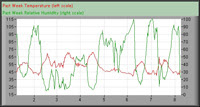We live on the sloping south side of a valley, a hundred feet or so higher than the valley floor. In the mornings we have often noticed a special clarity to the sounds we hear emanating from various places in the valley, up to a mile or so away from our home. Other times of the day the same sounds are quite noticably muted and “garbled”. What accounts for the difference?
Two differences between early mornings and other times come right to mind: ambient noise levels and humidity. The humidity differences are especially dramatic in the desert, as you can see from the green relatively humidity line on this chart (from my WeatherHawk weather station) of the past few days (use the right-hand scale). Ambient noise is a lot harder to quantify, though it is obviously much higher during the daytime, with many more cars running and with many people operating machinery. In the evenings, though, the ambient noise is much reduced while the humidity is still low — and my subjective observation is that the clarity I hear in the mornings is not there. That leaves relative humidity — and possibly temperature (for it is also usually much cooler in the early morning) — as the candidates.
With a little googling I found a very useful article at Simon Fraser University (in Canada). The graph at right comes from that article, and it shows that there are interesting attenuation effects of sound propagation in the atmosphere related to both temperature and humidity. The humidity variations are particularly interesting: at very low relative humidities, and at high (above 50% or so) relative humidities, there is very little attenuation of sound (e.g., sound travels very well under those conditions). But at relative humidities of about 5% to about 40% or 50%, there is significant attenuation. The difference in attentuation between 100% and 20% relative humidity is more than 3 to 1 — and that’s a difference that’s more than large enough to be perceived.
My next experiment is to try listening on a morning when the relative humidity is low (these occur here fairly frequently). It will be interesting to see, subjectively, whether the sound transmission is missing that special morning clarity.
And speaking of clarity, other sources I read made a simple point: the perception of clarity (as the word is meant in ordinary English) is primarily an effect of the loudness of the sound in question and the loudness of the background noise. So the unusual clarity we perceive in the morning is, I speculate, a combination of the reduced attenuation due to high relative humdity (making sounds louder), and the generally reduced level of background noise (because of reduced human activity at 4 or 5 AM)…
